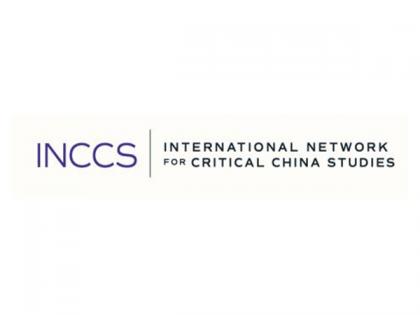INCCS report exposes China's expanding transnational repression against Uyghur diaspora
By ANI | Updated: August 14, 2025 21:25 IST2025-08-14T21:19:47+5:302025-08-14T21:25:00+5:30
London [UK] August 14 : The International Network for Critical China Studies (INCCS) has published a comprehensive report detailing ...

INCCS report exposes China's expanding transnational repression against Uyghur diaspora
London [UK] August 14 : The International Network for Critical China Studies (INCCS) has published a comprehensive report detailing the Chinese Communist Party's (CCP) escalating campaign of transnational repression against the Uyghur diaspora, targeting individuals, families, and organisations globally to suppress dissent and manage narratives regarding its policies in Xinjiang.
The report, titled Preventing Transnational Repression: The Case of the Uyghur Diaspora, written by David Tobin and Nyrola Elima, characterises transnational repression as actions taken by foreign governments to inhibit or constrain individuals' rights beyond their sovereign borders. It alerts that Uyghur-led civil society organisations (CSOs) are increasingly facing cyber harassment, human surveillance, infiltration, and pressure exerted on their families residing in China.
As per INCCS, Beijing's strategies arise from its "ethnic policy" in the Xinjiang Uyghur Autonomous Region and its global "soft power" objectives. Official Chinese communications instruct officials to monitor Uyghurs abroad, label them as "out of contact," and encourage them to return to China, frequently through threats made to their relatives. The CCP's surveillance networks reportedly employ both state agents and ordinary villagers who are financially incentivised.
INCCS also brings attention to a notable infiltration case: the 2025 arrest in Sweden of Dilshat Reshit, the former spokesperson for the World Uyghur Congress, on allegations of espionage for Chinese intelligence. The WUC has advocated for improved collaboration between counterintelligence agencies and Uyghur organisations to avert such infiltrations.
The authors emphasise that the CCP perceives Uyghur organisations as "key nodes of information" regarding human rights and governance, seeking to neutralise them through espionage, intimidation, and disinformation. They caution that neglecting to address these efforts could weaken advocacy initiatives and enable Beijing to manipulate the diaspora.
The report proposes enhanced cybersecurity protocols, broader community involvement beyond larger organisations, clear safeguarding processes, and timely alerts to individuals if their personal information might have been compromised. It also urges governments to regard infiltration as a national security issue while prioritising the protection of human rights defenders.
"China's transnational repression aims to limit information flows that could harm its international reputation and to cut ties between Uyghurs within and outside the PRC," the report concludes, calling for coordinated global efforts to uphold the rights and safety of the Uyghur diaspora.
Disclaimer: This post has been auto-published from an agency feed without any modifications to the text and has not been reviewed by an editor
Open in app